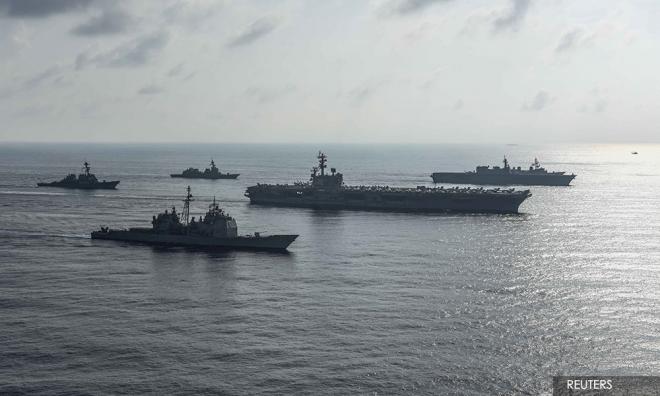
Published by Malay Mail, The Star & Focus Malaysia, image from Focus Malaysia.
The Auditor General’s Department of Malaysia cannot be clearer: between 2016-2019, which ranges across the administrations of former Prime Minister Najib Razak, and subsequently Prime Minister Dr Mahathir Mohamad, Chinese’s People Liberation Navy, Coast Guards and illegal floatila of fishermen encroached into the Malaysian Exclusive Economic Zones by 89 times.
That’s not counting how many sub-marine activities that China could have breached into the same. In turn, the Ministry of Foreign Affairs sent six diplomatic notes to protest against the behavior of China.
Unfortunately, all to no avail. This is why former Foreign Minister of Malaysia, Datuk Seri Anifah Aman, affirmed in a letter to Malaysia Kini that the time has come to “form a special committee” to report directly to the Prime Minister of Malaysia; ironically as it may seem, to bypass the Ministry of Foreign Affairs, he once led, to handle this aspect of Sino-Malaysia relationship.
Suggesting the above does not mean that Malaysia does not want to have a good relationship with China. As a trading nation, just as Malaysia needs China, China can benefit handsomely from Malaysia too, on trade. Be this bird’s nest or Traditional Chinese Medicine (TCM), there are enough buult-in incentives to enhance the relationship of the two countries; although the monopoly of any export to China should naturally not be confined to any one individual.
China, especially the Ministry of Foreign Affairs, is aware that the trade volume between China and Asean has exceeded the trade between China and European Union (EU).
There is no escaping the fact that if China wants to continue to make Asean it’s critical trading bloc, Beijing has to send true diplomats —- not Wolf Warriors —- to talk down on Asean or the claimant states of the disputed water of South China Sea.
“Wolf Warriors,” for the lack of better word, are those who insist that China is right on every issue. For example, China has the right to encroach into the territories of Malaysia not only 89 times but perhaps ten times more since these are waters that fall under Nine Dash Lines of China.
But in international maritime law, there must be latitude and longitudes to form the exact basis of claims. The waves, the currents, even the topography of the sea keep changing. Every negotiator on maritime issue knows that. This is a big ocean with huge currents not a static geography.
Some geo-political scholars have concluded that “take to the extreme of any positions, by all sides, war can be imminent, adopt the scientific and middle road approach, then all sides can thrive, including the tricky Sino-US relationship.”
The likes of such scholars understands the Century of Humiliation of China too. But China must understand the five centuries of colonialism experienced by Southeast Asia as well. But there is a Chinese saying which all negotiators in Mandarin would know too “When will peace prevail, if vindictiveness is never at any end ?”
In Malay, the phrase “Tak Kenal Maka Tak Cinta,” (One cannot know what one cannot love). It is time to love South China Sea as a global commons, where freedom of navigation is not put at a threat in any form or shape, whether in the sea, under the water, or, above the space of South China Sea. Without this simple dictum, China and Malaysia cannot set the good example for the rest of the claimant states to see the light. China has ancient wisdom by the shipload for 5000 years. So does Southeast Asia. But with South China Sea’s maritime bourne trade worth US$5-6 trillion a year, freedom of navigation is a must. South China or East China Sea cannot belong to China only; just as Tun Dr Mahathir once said Indian Ocean cannot belong to India only.
Dr. Rais Hussin is President & CEO of EMIR Research, an independent think tank focused on strategic policy recommendations based on rigorous research.

